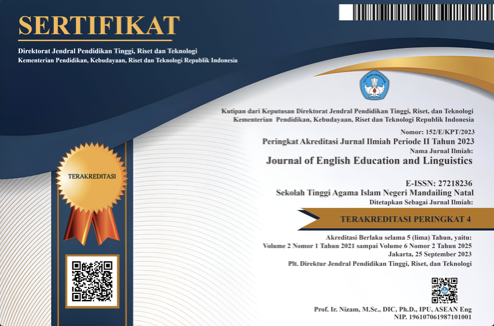EXPLORING THE IMPLEMENTATION OF GIMKIT AS A FORMATIVE ASSESSMENT TOOL IN ENGLISH LANGUAGE LEARNING: PRACTICE AND EXPERIENCE
DOI:
https://doi.org/10.56874/jeel.v5i2.1890Keywords:
English, experience, learning media, modern, online, assessment.Abstract
This study aims to find out how teachers implement the concept of gamification with the Gimkit platform and students' experiences of using the Gimkit platform as a formative assessment tool in English language learning. This research was conducted in a high school in Madiun, Indonesia. The research started from a case study where the researcher found that many students did not want to participate in formative assessment activities because they thought that the atmosphere during formative assessment with traditional methods would only make students afraid and unable to focus on the questions. Semi-structured interviews were conducted with 10 students and 1 English teacher to collect data, and the data obtained was analysed using thematic analysis. The findings of this study show that teachers have several reasons related to the use of Gimkit, the first is because of technological advances, and the utilisation of facilities, teachers also provide information related to how to implement the Gimkit platform from the initial stage to the assessment stage, teachers also tell how students react when implementing formative assessment using Gimkit which has a positive impact because students become more interested in the activity, feel relaxed when working, and students can learn new English vocabulary from Gimkit., the use of Gimkit was also considered easy by students both in terms of preparation and use during formative assessment, the use of Gimkit also had a positive influence on students because students felt that when using Gimkit they experienced increased motivation and gained new knowledge.
References
Alsaadi, H. M. A. (2021). Dynamic Assessment in Language Learning; An Overview and the Impact of Using Social Media. English Language Teaching. https://doi.org/10.5539/elt.v14n8p73
Ary, D., Jacobs, L. C., & Razavieh, A. (2010). Introduction to research in education 8th edition, Wardswoth Cengage Learning. Canada: Nelson Education Ltd Exotic Classic.
Bogdan, R., & Biklen, S. K. (1982). Qualitative Research for Education: An introduction to theories and methods. Boston: Allyn and Bacon. Inc.
Bratel, O., Kostiuk, M., Okhrimenko, I., & Nanivska, L. (2023). Student-Centered Online Assessment in Foreign Language Classes. World Journal of English Language, 13(1), 185–194.
Brown, H. D. (2004). Language Assessment: Principles and Classroom Practices. H. Douglas Brown. In 2004.
Budiati. (2017). ICT (Information and Communication Technology) Use: Kahoot Program for English Students’ Learning Booster. Education and Language International Conference.
Iman, N., Ramli, M., & Saridewi, N. (2021). Kahoot as an Assessment Tools: Students’ Perception of Game-based Learning Platform. Jurnal Penelitian Dan Pembelajaran IPA, 7(2), 245. https://doi.org/10.30870/jppi.v7i2.8304
Ismail, M. A. A., Ahmad, A., Mohammad, J. A. M., Fakri, N. M. R. M., Nor, M. Z. M., & Pa, M. N. M. (2019). Using Kahoot! as a formative assessment tool in medical education: A phenomenological study. BMC Medical Education, 19(1). https://doi.org/10.1186/s12909-019-1658-z
Lee, C. C., Hao, Y., Lee, K. S., Sim, S. C., & Huang, C. C. (2019). Investigation of the effects of an online instant response system on students in a middle school of a rural area. Computers in Human Behavior. https://doi.org/10.1016/j.chb.2018.11.034
Leenknecht, M., Wijnia, L., Köhlen, M., Fryer, L., Rikers, R., & Loyens, S. (2021). Formative assessment as practice: the role of students’ motivation. Assessment and Evaluation in Higher Education, 46(2), 236–255. https://doi.org/10.1080/02602938.2020.1765228
Lisniyanti, K., Wahyudi Purnama, D., & Aminah, M. (2023). Improving Students’ Reading Comprehension by Using Kahoot! Biormatika?: Jurnal Ilmiah Fakultas Keguruan Dan Ilmu Pendidikan. https://doi.org/10.35569/biormatika.v9i1.1211
Nurhadianti, & Pratolo, B. W. (2020). Students’ perception toward the application of Kahoot! As an assessment tool in EFL class. Universal Journal of Educational Research, 8(5), 2150–2155. https://doi.org/10.13189/ujer.2020.080554
Overton, Terry. (2014). Assessing Learners with Special Needs: An Applied Approach (7th Edition). Pearson.
Ozan, C., & K?ncal, R. Y. (2018). The effects of formative assessment on academic achievement, attitudes toward the lesson, and self-regulation skills. Kuram ve Uygulamada Egitim Bilimleri. https://doi.org/10.12738/estp.2018.1.0216
Paramitasari, A., & Ambarwati, A. (2020). THE ADVANTAGES AND DISADVANTAGES OF USING ICT IN ENGLISH LANGUAGE TEACHING. ENRICH: Jurnal Pendidikan, Bahasa Dan Linguistik.
Park, J., Kim, S., Kim, A., & Yi, M. Y. (2019). Learning to be better at the game: Performance vs. completion contingent reward for game-based learning. Computers and Education. https://doi.org/10.1016/j.compedu.2019.04.016
Stoyanova, M., Tuparova, D., & Samardzhiev, K. (2018). Impact of motivation, gamification and learning style on students’ interest in maths classes – a study in 11 high school grade. Advances in Intelligent Systems and Computing. https://doi.org/10.1007/978-3-319-73204-6_17
Wang, A. I., & Tahir, R. (2020). The effect of using Kahoot! for learning – A literature review. Computers and Education. https://doi.org/10.1016/j.compedu.2020.103818
Downloads
Published
Issue
Section
License
All articles published in the Journal of English Education and Linguistics are licensed under a Creative Commons Attribution-ShareAlike 4.0 International (CC BY-SA) license. This means anyone is free to copy, transform, or redistribute articles for any lawful purpose in any medium, provided they give appropriate attribution to the original author(s) and Journal of English Education and Linguistics, link to the license, indicate if changes were made, and redistribute any derivative work under the same license.
Copyright on articles is retained by the respective author(s) without restrictions. A non-exclusive license is granted to the Journal of English Education and Linguistics to publish the article and identify itself as its original publisher, along with the commercial right to include the article in a hardcopy issue for sale to libraries and individuals.
Although the conditions of the Creative Commons Attribution-ShareAlike 4.0 International (CC BY-SA) license do not apply to authors (as the copyright holder of your article, you have no restrictions on your rights), by submitting to the Journal of English Education and Linguistics, authors recognize the rights of readers and must grant any third party the right to use their articles to the extent provided by the license.

This work is licensed under a Creative Commons Attribution-ShareAlike 4.0 International License.








